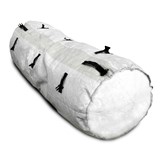The manufacturing employment sub index of the Australian PMI® recorded a disturbingly low level of 32.8. This was a particularly sharp fall of almost 10 points in February. The manufacturing sub index has recorded an uninterrupted run of falling employment in each month over the past year. Like manufacturing activity, the fall in employment is also very broad based. No sub sector recorded a rise in employment in February.
"Notwithstanding the favourable impacts of the December cash bonuses and successive falls in official interest rates as yet there are very few signs of any rebound in activity, indeed the industry is weakening. The Australian PMI® new orders sub index recorded a fall in new orders for a 10th successive month. The sub index fell by 3.7 points to a very low level of 28.1 in February. No sector recorded a rise in new orders. This is in part reflecting the run down in stocks, a phenomenon occurring worldwide in manufacturing. Once this process has unwound it’s hoped we’ll see some pick up in demand," Ridout said.
"The growing impact of the global crisis is now being felt acutely by the manufacturing sector. Demand for exports has fallen and domestic, business and consumer confidence is very fragile. Many businesses are reporting difficulty in accessing the finance required not only for investment but also for working capital. These are ingredients that could fuel an escalation of the downturn. They point to the importance of the stimulus package passed by the Parliament in February. We expect the further cash bonuses, the investment allowance and the roll out of schools, housing and home insulation programs will be vital for both the manufacturing sector and the broader economy over coming months," Ridout said.
"The severity of the current situation as illustrated by the Australian PMI® is coming at a time when manufacturing businesses are well advanced in implementing new, more globally integrated business models. In many cases the widespread restructuring brought about by the impacts of the minerals boom and the higher Australian dollar have barely been bedded down. The industry now finds itself in a very different and even more testing business environment," Ridout said.
PricewaterhouseCoopers Global Leader of Industrial Manufacturing, Graeme Billings, said, "The February Australian PMI® shows that the squeeze on manufacturing profitability, which tightened over much of 2008, has continued into 2009.
"Unfortunately, the market weakness which saw selling prices stagnate in February is unlikely to improve significantly in the near-term. This will put further pressure on margins and mean that a focus on costs is the key strategy for managing the impact of the downturn on profitability. While slower growth in wages costs will help, a rethink of business plans and improved productivity will help to minimise unit costs. It is also important that firms maintain readiness for the upturn and, where feasible, continue efforts to sustain product innovation, maximise the benefits from global supply chains and retain valuable skilled workers," Billings said.
Australian PMI® Key Findings for February:
- Manufacturing activity fell for a ninth consecutive month in February. The Australian PMI® recorded 31.7 in February, a fall of 4.9 points on the previous month. All components fell and remained below 50, indicating falls in the level of each indicator.
- Ongoing falls in new orders and inventory rundowns continued to push production and employment lower. New orders fell for a tenth consecutive month in February, while inventories also fell again, for the fifth successive month. This de-stocking process in the face of persistent weaker demand has contributed to production falling for nine months in a row. As production has eased, employment has now dropped in twelve successive months. The ongoing deterioration in the developed and emerging economies including China and slower domestic growth continue to constrain the sector’s performance.
- Lower interest rates and the government’s fiscal stimulus to boost consumer confidence, infrastructure and housing spending should provide support for demand for manufactured products but this will happen with a lag.
- Input cost growth rose slightly, while selling prices fell marginally in February. Wages grew at the lowest rate since June 1998.
- Manufacturing activity fell in all states, with the strongest declines recorded in Victoria and Tasmania.




